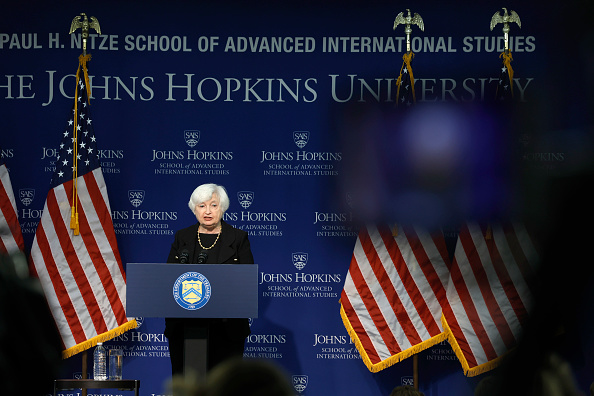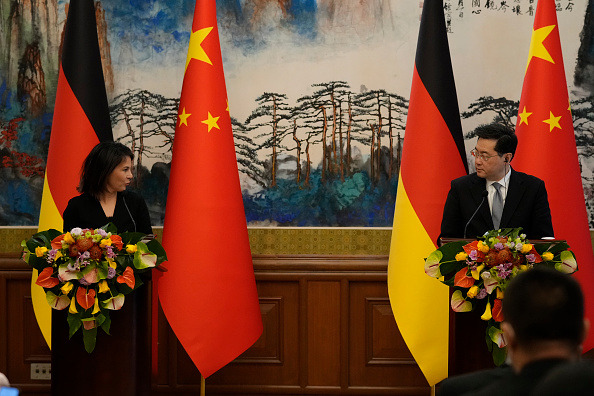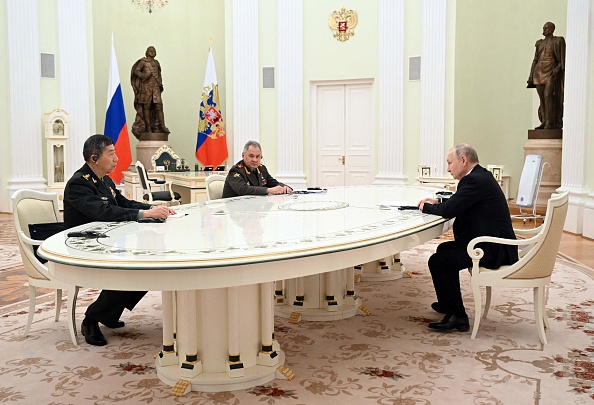
 Constructive and Fair
Constructive and FairU.S. Treasury secretary Janet Yellen issued a stark warning that any effort to decouple from China would be "disastrous." She called for a "constructive and fair" economic relationship between China and the U.S., and sent a message to assure Beijing that efforts to limit their access to advanced technologies are confined to those with national security concerns, rather than a broader strategy to "stifle" the Chinese economy.
"The U.S. will assert ourselves when our vital interests are at stake," the Treasury secretary said, striking a conciliatory tone amid fierce political tensions. "But we do not seek to 'decouple' our economy from China's. A full separation of our economies would be disastrous for both countries. It would be destabilizing for the rest of the world."
However, Yellen stood firm in the conviction that the U.S. should defend its values and national security, despite the possible economic impacts."We will not compromise on these concerns even when they make those tradeoffs with our economic interests," she said.
In a Twitter thread posted after her speech, Yellen said the principal objectives in the U.S. economic relationship with China are to protect U.S. national security interests and to protect human rights; to seek a healthy relationship that "fosters growth and innovation in both countries"; and to cooperate on the "urgent global challenges of our day." She also rejected the premise of looking at the U.S.-China relations through the lens of a zero-sum contest where one must fall for the other to rise.
Despite the softened tone, in the coming weeks, President Joe Biden plans to sign an executive order that will limit investment in key parts of China's economy by American businesses, which experts anticipate is a sign that economic relations are set to deteriorate further.
Meanwhile, President Xi has hosted multiple bilateral meetings with world leaders in Beijing in recent weeks and stood shoulder-to-shoulder with leaders of Brazil, France, and the European Union. However, Beijing continues to reject attempts by the Biden administration to restart high-level talks and lower tensions over Taiwan.
Learn more in "The Right Way Forward for U.S.-China Relations," an interview with Wang Jisi, a professor at Peking University.
 Strategic Judgements
Strategic JudgementsGerman Foreign Minister Annalena Baerbock sent a warning to China to de-escalate tensions over Taiwan, warning that any attempt by China to control Taiwan would be unacceptable.
"A military escalation in the Taiwan Strait, through which 50 percent of world trade flows every day, would be a horror scenario for the entire world," Baerbock said at a joint press conference with Foreign Minister Qin Gang.
Baerbock raised concerns over what she described as China's instincts to follow its own rules at the expense of the international rules-based order, and said that Beijing was increasingly becoming a systemic rival more than a trade partner and competitor.
Baerbock's remarks come just as tensions across the Taiwan Strait have risen to the point where the risk of armed conflict is at "an all-time high," according to a think tank in Beijing. Earlier this month, China carried out a three-day military drill in response to House Speaker Kevin McCarthy's meeting with Taiwanese President Tsai-Ing Wen.
Meanwhile, China has sent a clear message that Berlin should avoid "strategic misjudgments" in its policy towards China and support the peaceful unification of Taiwan.
"China and Germany have to cooperate and not confront [each other]. Neither a zero-sum consultation or bloc confrontation is necessary," said Foreign Minister Qin Gang.
Following her recent trip to Beijing earlier this month, European Commission President Ursula von der Leyen on Tuesday again warned against an escalation in the Taiwan Strait. saying the EU has "consistently called for peace and stability in the Taiwan Strait, and we stand strongly against any unilateral change of the status quo, in particular by the use of force."
Learn more in "Conflict is Not Inevitable," an interview with Dr. Michael Swaine, a senior research fellow at the Quincy Institute for Responsible Statecraft.
 Bolstering Ties
Bolstering TiesChinese Defense Minister General Li Shangfu expressed China's commitment to further enhance military cooperation with Russia during his visit to Moscow this week. The Chinese leader held talks with his Russian counterpart Sergei Shoigu after attending a meeting with Russian President Vladimir Putin in the Kremlin, where both countries pledged to strengthen bilateral ties and declared a "no-limits" partnership.
General Li, who has been under U.S. sanctions since 2018, praised Russia's military modernization efforts and emphasized China's willingness to deepen military cooperation, including in the areas of military-technical ties and arms trade. Putin and Xi have recently vowed to develop military cooperation and have worked closely to conduct more joint sea and air patrols.
The Chinese Defense Minister also underscored the need for both countries to work closely on issues related to the global security situation and affirmed that they "have very strong ties" which "surpass the military-political alliances of the Cold War era."
Some analysts have argued that the visit reflects China's growing engagement with Russia amid their shared vision to shape the world order and reduce the influence of the U.S. and its Western allies.
After more than a year of fighting in Ukraine and facing Western sanctions, Russia's dependence on China has increased significantly, resulting in a 30% increase in bilateral trade. While China has not directly criticized Russia's actions in Ukraine and instead blamed the U.S. and NATO for provoking Moscow, China's foreign minister has reaffirmed that Beijing will not sell weapons to either side in the conflict.
Prepared by China-US Focus editorial teams in Hong Kong and New York, this weekly newsletter offers you snap shots of latest trends and developments emerging from China every week, while adding a dose of historical perspective.
- 2023-04-14 Shoulder-to-Shoulder
- 2023-04-07 Push and Pull
- 2023-03-31 Tsai in Transit
- 2023-03-24 A Changing World
- 2023-03-17 Peacemaker Xi
- 2023-03-10 Party Time
- 2023-03-03 “An Existential Struggle”
- 2023-02-24 Opposing Worldviews
- 2023-02-17 Ripple Effects
- 2023-02-10 Ballooning Tensions
- 2023-02-03 Hot Air
- 2023-01-27 Spheres of Influence
- 2023-01-20 China's Davos Pitch
- 2023-01-13 Strategic Encounters
- 2023-01-06 Common Challenges
- 2022-12-23
- 2022-12-16 All in On Africa
- 2022-12-09 Seeking Stabilization
- 2022-12-02 Turf Tension
